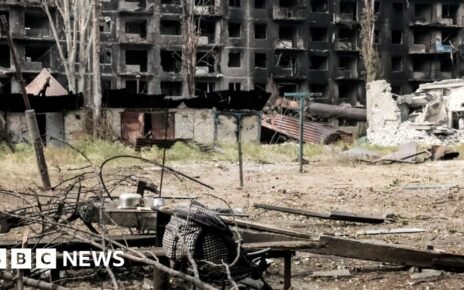[ad_1]
The UK has announced it is giving up sovereignty of a remote but strategically important cluster of islands in the Indian Ocean after more than half a century.
The deal – reached after years of negotiations – will see the UK hand over the Chagos Islands to Mauritius in a historic move.
This includes the tropical atoll of Diego Garcia, used by the US government as a military base for its navy ships and long-range bomber aircraft.
The announcement, made in a joint statement by the British and Mauritian Prime Ministers on Thursday, ends decades of often fractious negotiations between the two countries over the islands.
The US-UK base will remain on Diego Garcia – a key factor enabling the deal to go forward at a time of growing geopolitical rivalries in the region between Western countries, India, and China.
“Following two years of negotiation, this is a seminal moment in our relationship and a demonstration of our enduring commitment to the peaceful resolution of disputes and the rule of law,” the statement from UK PM Keir Starmer and Mauritius PM Pravind Jugnauth said.
The deal is still subject to a finalisation of a treaty which both sides have vowed to complete as quickly as possible.
“Under the terms of this treaty the United Kingdom will agree that Mauritius is sovereign over the Chagos Archipelago, including Diego Garcia,” the statement read.
“At the same time, both our countries are committed to the need…to ensure the long-term, secure and effective operation of the existing base on Diego Garcia which plays a vital role in regional and global security.”
In recent years, the UK has faced rising diplomatic isolation over its claim to what it refers to as the British Indian Ocean Territory, with various United Nations bodies, including its top court and general assembly, overwhelmingly siding with Mauritius and demanding the UK surrender what some have called its “last colony in Africa”.
The government of Mauritius has long argued that it was illegally forced to give the Chagos Islands away in return for its own independence from the UK in 1968.
At the time, the British government had already negotiated a secret deal with the US, agreeing to lease it the largest atoll, Diego Garcia, for use as a military base.
Britain later apologised for forcibly removing more than 1,000 islanders from the entire archipelago and promised to hand the islands to Mauritius when they were no longer needed for strategic purposes.
But until very recently, the UK insisted that Mauritius itself had no legitimate claim to the islands.
For decades, the tiny island nation of Mauritius struggled to win any serious international support on the issue.
A handful of Chagos islanders, who’d been forced to abandon their homes in the late 1960s and early 70s, repeatedly took the British government to court.
But it was only recently that international opinion began to shift.
For a start, African nations began to speak with one voice on the issue, pushing the UK hard on the issue of decolonialisation.
Then Brexit left many European nations reluctant to continue backing the UK’s stance in international forums.
The Mauritian government went on the attack, accusing the UK government of verbal threats.
And the Mauritians began to wage an increasingly sophisticated campaign – at the UN, in courts, and in the media – even landing and planting a flag on the archipelago without British authorisation.
The negotiations that brought about Thursday’s deal began years before Sir Keir Starmer became prime minister.
But the timing of this breakthrough reflects a growing sense of urgency in international affairs, not least regarding Ukraine, with the UK keen to remove the Chagos issue as an obstacle to winning more global support, particularly from African nations, with the prospect of a second Trump presidency looming.
The Chagos islanders themselves – some in Mauritius and the Seychelles, but others living in Crawley – do not speak with one voice on the fate of their homeland.
Some are determined to return to live on the isolated islands, some are more focused on their rights and status in the UK, while others argue that the Chagos archipelago’s status should not be resolved by outsiders.
A backlash from some voices in the UK can be expected, even though successive Conservative and Labour prime ministers have both been working towards the same broad goal.
But there can be no doubting the historic significance of this moment.
Half a century or more after the UK relinquished control over almost all its vast global empire, it has finally agreed to hand over one of the very last pieces. It has done so reluctantly, perhaps, but also peacefully and legally.
The remaining British overseas territories are: Anguilla, Bermuda, British Antarctic Territory, British Virgin Islands, Cayman Islands, Falkland Islands, Gibraltar, Montserrat, Pitcairn, St Helena, Tristan da Cunha, Turks and Caicos Islands.
[ad_2]
Source link



